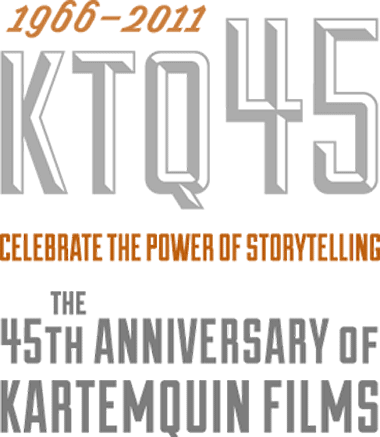Kartemquin Films Celebrates 45 Very Good Years at Metro
By Steven Pate in Arts & Entertainment on Sep 14, 2011 4:00PM
 On a tour of the offices of the documentary film company Kartemquin earlier this summer, it wasn't the editing bays that got the most attention from our guide, nor the video equipment on which Hoop Dreams was stitched together by a process which seems almost prehistoric now, nor any of the working spaces in that hive of activity hidden behind a long-disused storefront on a shady North Center street.
On a tour of the offices of the documentary film company Kartemquin earlier this summer, it wasn't the editing bays that got the most attention from our guide, nor the video equipment on which Hoop Dreams was stitched together by a process which seems almost prehistoric now, nor any of the working spaces in that hive of activity hidden behind a long-disused storefront on a shady North Center street.
It was an old camera, tucked away on a high shelf in a closet. "Would you like to see Camera Number 1?" asked our guide Tim Horsburgh in the same tone that an Apple store employee might use if he just happened to have Steve Jobs' original Macintosh stashed in the trunk of his car.
It was through this modified Auricon, crafted in Chicago by Dan Auerbach in 1966 and modeled after the cameras Richard Leacock, D.A. Pennebaker and Albert Maysles had built in New York, that University of Chicago undergraduates Stan Karter, Jerry Temaner and Gordon Quinn looked at the world in a way that still seems new. Not a chopped up and packaged reality, but a direct confrontation with it, as close to being there as possible, but never pretending the camera wasn't there.
Beginning with Home For Life, a look at two people experiencing their first month in a home for the elderly, the template was established: an unwavering focus on social issues, collective organization and effort, and a "direct cinema"-inflected approach that capitalized on newly unobtrusive techniques for capturing sound together with the film image to get into intimate spaces with their subjects.
From the start, the results were extraordinary. If you would like to take a time machine back to the Chicago of 40 years ago, you can't do better than the early documentaries from Kartemquin. From fascinating looks at the sentiments of everyday people around the city (Inquiring Nuns) to portraits of the counterculture and student radicals to documenting their own experiences with pregnancy and natural childbirth, these were filmmakers doing their best to present life in as raw a form as they possibly could.
Staying true to that vision over the ensuing decades meant there were times when the stories they were investigating weren't the ones a lot of folks wanted to hear at that moment (e.g. the Taylor Chain movies from 1980 and 1984, about striking workers and collective bargaining at a Hammond, IN factory), and there are other moments when the story a film tells coincides with a widespread desire to hear it (Hoop Dreams surely tops that list).
Now cresting the wave of a new international sensation with The Interrupters, Kartemquin finds itself not only the subject of retrospectives around the country, but the occasion for a celebration of its anniversary and contribution to the art of storytelling at Metro.
The event will feature previews of Kartemquin releases for 2012, live music by Mar Caribe, appearances by Allison Cuddy and Hoop Dreams/The Interrupters director Steve James and a lot of faces from the company's four and a half decades. This might be your only chance to catch a lot of those folks, who have been hopping around the festival circuit and on promotional engagements for The Interrupters, but who don't seem to be anticipating much downtime: Kartemquin is also the subject of a retrospectives at the Milwaukee Film Festival later this month, in Toronoto in October, and in Virginia in November.
Luckily for us locals, a 10-week retrospective featuring 19 Kartemquin documentaries also kicks off at Doc Films beginning Oct. 2. For now, the large and vibrant Kartemquin family should enjoy the fruits of a busy and productive year with the bonus of a spotlight shining a bit brighter on them than in the previous 44.
Tickets for Thursday's Kartemquin Anniversary event at The Metro are still available online.